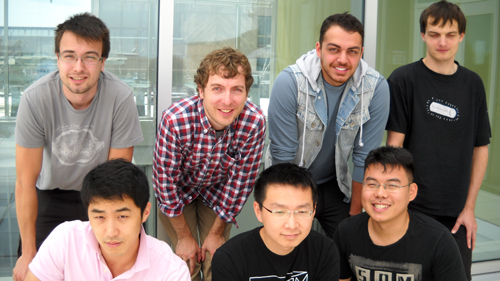
Engineering professor Graham Taylor studies machine learning. But there’s also some human learning across cultures happening in his lab this summer.
Under an international academic matchmaking program, Taylor is now hosting a third-year computer science student from Dalian University in China. Ruoyan “Ryan” Wang is working with his research team on a project in automated visual recognition.
Taylor is one of five Guelph professors adding international perspectives to their labs this year with undergrad student interns recruited from abroad through the Mitacs Globalink program.
Under the program, Mitacs — a not-for-profit research and training organization for young researchers — matches top international undergraduates for summer research postings with Canadian professors.
“It’s about connecting Canadian universities into global knowledge flows,” says Rob Annan, interim CEO and scientific director of Mitacs. “The idea is to provide a positive experience in Canada and build connections with these students.”
Globalink started in 2009 with 17 students from outside Canada. Last year, the program drew 300 interns. This summer, 500 international students are working at 50 Canadian universities.
Guelph joined the program in 2010. This summer, students from India, China, Brazil and Mexico have worked with Guelph engineering professors Taylor, Mohammad Biglarbegian, Jana Levison and Suresh Neethirajan, and integrative biology professor Joe Ackerman.
Based at the University of British Columbia, Mitacs runs several programs to help students and recent grads develop research and business skills, and to help industry gain access to research expertise.
Globalink matches Canadian researchers with undergrad students in India, China, Brazil, Mexico, Turkey, Vietnam and the Sorbonne universities in France. Mitacs co-ordinates job postings from Canadian researchers and applications from students abroad, giving faculty members a shortlist of international applicants based on grades and research interests.
“Mitacs takes care of business,” says Taylor. “It takes a huge load off the professor.”
Rebecca Bourque, Mitacs director of strategic accounts and business development for Guelph, promotes the program with U of G faculty and administrators. She also builds collaborations with local industry.
This summer’s students have visited Innovation Guelph and Food Research Centre, for example. “We connect them to industry,” says Bourque.
Students spend 12 weeks on their summer research sojourn in Canada. More than half end up publishing or presenting their work in academic journals and gatherings, says Annan.
The program is meant to complement summer research opportunities for Canadian students, such as Guelph’s undergraduate research assistantships and programs supported by federal granting agencies.
Annan says the Globalink program offers benefits for Canadian faculty members and universities.
“They get funding and students for the summer, and they can build out their research team.” Forging international ties can be a challenge particularly for younger professors. “This allows them to build some connections without having to do the hard legwork of recruiting students from these places.”
International visitors bring novel experiences and approaches to Canadian research labs, says Taylor. “They’ll look with different perspectives and a different way, and that’s usually what leads to discovery.”
Through Mitacs, he set up a Skype interview with Wang in China earlier this year. The student arrived in June and will be here until early September.
Wang’s studies may ultimately help social networks such as Facebook refine detection of images in profile photographs. Referring to equipment in Taylor’s lab, he says, “I’ve learned some useful technical skills in my research area.”
What’s the professor learning in turn?
“You take communication for granted,” says Taylor, who had two interns from India last summer.
Working with international students reminds him to pay attention to cultural differences and communication in the lab. Referring to Wang, he says, “He’s taught me to be aware of subtleties. He teaches me to be a bit more careful to make sure he’s really in that communication loop.”
Wang is living with the other Globalink students in East Residences on campus. He’s visited Guelph Lake and looked for Canadian wildlife in the U of G Arboretum.
“It’s always good to change your environment, to experience something different,” he says. Contrasting Guelph with his homeland, he adds, “Here there is more fresh air — and wildlife, I never see them back in China.”
What’s he missing?
“Oh, Chinese food.”
Can’t he find his favourites on campus or in town? “Not real Chinese food. To me, it’s just some weird brand of Cantonese food.”
Mitacs finds local student mentors to help the Globalink interns settle into their summer home. This year, U of G undergrads Jenna McGillivray and LeChelle Saunders are serving as mentors. “We make sure they’re fitting in,” says McGillivray, a fourth-year student in environmental sciences.
She chats on Facebook every few days with three of this year’s interns. Both mentors have met the international students for lunch several times and arranged a trip to Toronto.
They plan to take the students on a zip-line trek in Brampton and a visit to Niagara Falls. They’re also hoping to spend an evening at Guelph’s Mustang drive-in theatre. “I think that’s pretty North American. None of them knew what that was,” says McGillivray.
She played a similar role last year as a volunteer with the Guelph Link program for international exchange students.
“I like travelling, but being in school I don’t have an opportunity to travel that often or at all, so it’s nice. I like having the exchange students come and learning about their culture. It’s nice to meet new friends from other countries and make them comfortable.”
The Globalink program is funded by the federal government and by some provincial governments, and is supported by participating universities as well as partner countries.
Canadian researchers have submitted about 1,800 projects for next summer, says Annan. International students will begin applying in the fall. Last year, Mitacs received 4,000 student applications from its partner countries.
In a recent development, Canadian undergrad and graduate students can also apply for Globalink fellowships in partner countries.
Under another fellowship program, Mitacs offers partial funding for Globalink “graduates” to return to Canadian universities for grad studies.